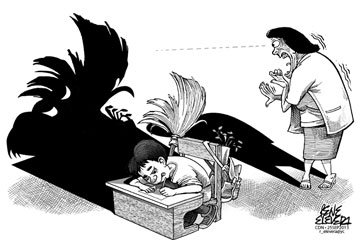
The latest incident happened Monday in Quiot High School in Cebu City’s south district. Eleven girls started screaming, flailing their arms, or speaking in a voice that was not theirs.
Was this demonic possession?
You would have to ask experts first because confirmed cases of mass possession are rare.
Fr. Gabriel Amorth, a Rome-based exorcist known the world over says determining whether a person is possessed is more complicated than ticking off a checklist of symptoms.
Amorth describes a complicated process including checking the eyes of the reportedly possessed in the middle of an exorcism rite.
If the eyes turn white, pupils having rotated away from view, this is a sign of possession, on top of the person’s aversion to holy water or the crucifix.
Amorth would likely concur with Msgr. Achilles Dakay of the Cebu Archdiocese who said the Quiot case has to be examined carefully because it could simply be a case of mass hysteria, something that should be handled first by a doctor or counsellor before calling in a priest.
We understand why some parents rushed to the scene with rosary beads and even an image of the Blessed Virgin Mary.
Protection of children is a high priority, whether it be a response to kidnapping threat or spiritual warfare.
But it’s about time school authorities, especially guidance counselors, adopt a protocol for cases like this that border on superstition -(the popular belief was that disturbing “spirits” of a tree that was chopped down on campus triggered the “attack”).
The commotion takes place in a school, where education is supposed to arm both students and teachers with useful, scientific information.
Conditions of fear and stress among a group of impressionable youths, especially girls, are factors noted in various psychological studies of the phenomenon of mass hysteria. The behavior can be set off by one “leader” and the suggestion could be so strong, that others involuntarily follow.
The response to such episodes should be sober, practical and sensitive to the religious sensibilities of the students and their families, with highest premium on the wellbeing of the young victims.
Separating them quickly and calming them down usually ends the episode. Then caring elders can find out what exactly is bothering the children, whether it be traumas and troubles at home or in school.